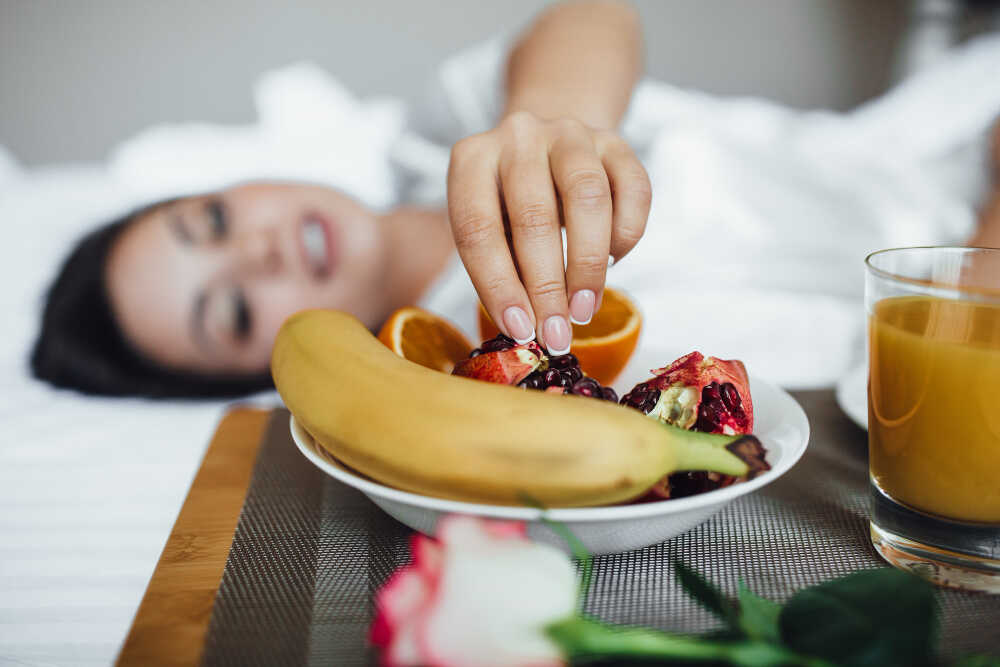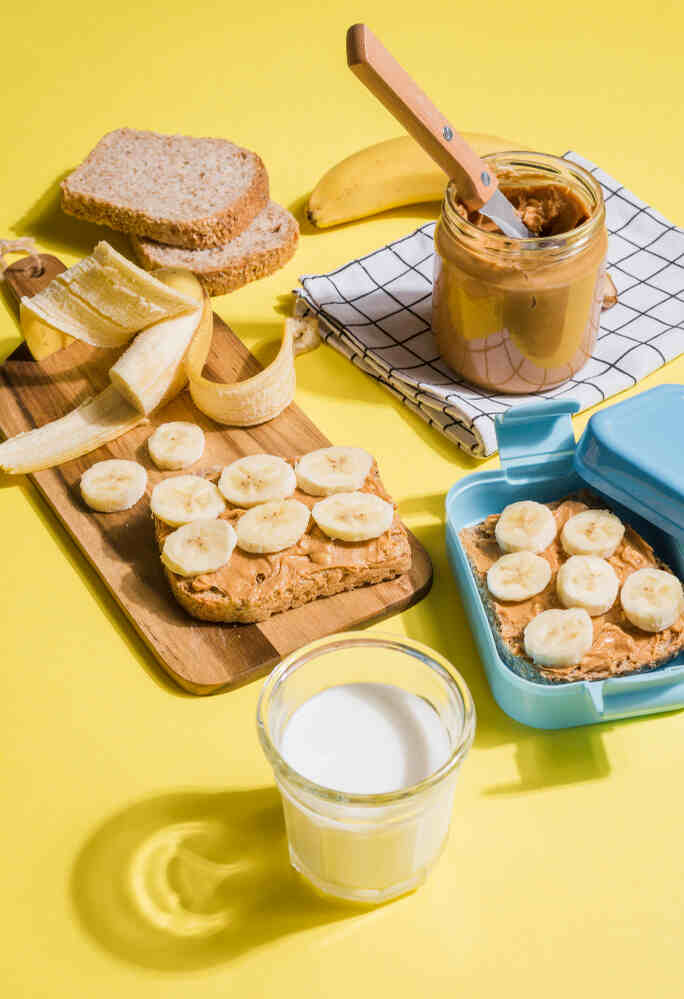Banana and peanut butter is a classic snack combination loved for its delicious taste and creamy texture. Whether spread on toast, blended into smoothies, or eaten straight from the spoon, this duo is a go-to choice for fitness enthusiasts, busy professionals, and anyone looking for a quick and satisfying snack.
But is banana and peanut butter actually healthy? While both ingredients offer important nutrients, their overall impact on health depends on factors like portion size, ingredient quality, and individual dietary needs.
In this article, we’ll break down the nutritional value of bananas and peanut butter, explore their health benefits, and discuss potential downsides to help you determine whether this snack fits into your diet. Plus, we’ll share the best ways to enjoy this combination for maximum health benefits.
Nutritional Breakdown

Bananas and peanut butter each bring a unique set of nutrients to the table, making this combination both delicious and nutritionally balanced. Let’s take a closer look at their individual benefits and how they work together.
Banana Nutrition
Bananas are a naturally sweet and fiber-rich fruit packed with essential vitamins and minerals. A medium banana (about 118g) contains:
- Calories: ~105
- Carbohydrates: ~27g (including natural sugars)
- Fiber: ~3g (supports digestion and satiety)
- Vitamin B6: Helps with brain function and energy metabolism
- Vitamin C: Supports immune health
- Potassium: ~422mg, which aids in muscle function and heart health
Peanut Butter Nutrition
Peanut butter provides healthy fats, protein, and important micronutrients. Two tablespoons (32g) of natural peanut butter typically contain:
- Calories: ~190
- Protein: ~7-8g (supports muscle repair and satiety)
- Healthy Fats: ~16g (mostly heart-healthy monounsaturated and polyunsaturated fats)
- Fiber: ~2g (aids digestion)
- Magnesium: Supports muscle and nerve function
- Vitamin E: A powerful antioxidant that promotes skin and immune health
How They Work Together
Pairing bananas with peanut butter creates a balanced snack that provides a mix of carbohydrates, protein, and healthy fats. The banana delivers quick energy, while peanut butter slows digestion, keeping you fuller for longer. This combination is especially beneficial as a pre- or post-workout snack, offering sustained energy and muscle recovery benefits.
Health Benefits
Banana and peanut butter isn’t just a tasty snack—it also offers a variety of health benefits. From boosting energy to supporting heart health, this combination can be a nutritious addition to your diet when consumed in moderation.
1. Energy Boost: Ideal Pre/Post-Workout Snack
Bananas are rich in carbohydrates, which are the body’s primary source of quick energy. Paired with peanut butter’s protein and healthy fats, this snack provides both immediate fuel and sustained energy. Eating it before a workout can help enhance endurance, while after a workout, it aids in muscle recovery by replenishing glycogen stores.
2. Supports Heart Health: Potassium + Healthy Fats
Heart health is one of the biggest advantages of this combination. Bananas are a great source of potassium, a mineral that helps regulate blood pressure and reduce the risk of heart disease. Peanut butter, especially the natural kind, contains heart-healthy monounsaturated and polyunsaturated fats, which can help lower bad cholesterol (LDL) and support cardiovascular function.
3. Aids Digestion: Fiber-Rich Combo
Both bananas and peanut butter contain dietary fiber, which plays a key role in digestion.
- Bananas contain soluble fiber, which helps regulate blood sugar levels and promote gut health.
- Peanut butter contains insoluble fiber, which helps keep bowel movements regular and prevents constipation.
Together, they create a gut-friendly snack that supports healthy digestion.
4. Muscle Recovery: Protein + Potassium
Muscle recovery is crucial after exercise, and this snack helps in multiple ways:
- Bananas provide potassium, which helps prevent muscle cramps and speeds up recovery.
- Peanut butter is rich in protein, which aids in muscle repair and growth.
For athletes and fitness enthusiasts, a banana with peanut butter is an easy and effective post-workout recovery snack.
5. Can Aid Weight Management: Satiety from Fiber and Protein
Despite being calorie-dense, peanut butter is rich in protein and healthy fats, which help reduce hunger and increase satiety. Bananas add natural sweetness and fiber, making the combination more filling than processed snacks. When consumed in moderation and with portion control, this snack can help prevent overeating and support weight management.
Potential Downsides
While banana and peanut butter can be a nutritious snack, there are a few potential downsides to consider. Paying attention to ingredient quality and portion sizes can help you maximize the benefits while avoiding unwanted health risks.
1. Added Sugar in Peanut Butter
Not all peanut butter is created equal. Many commercial brands contain added sugars, hydrogenated oils, and preservatives, which can contribute to weight gain, inflammation, and blood sugar spikes. To keep your snack as healthy as possible, opt for natural peanut butter with just two ingredients—peanuts and salt. This ensures you’re getting all the nutritional benefits without unnecessary additives.
2. Caloric Density: Portion Control is Key
Peanut butter is calorie-dense, with about 190 calories per two-tablespoon serving. While this makes it a satisfying snack, eating too much can easily lead to excess calorie intake, which may contribute to weight gain over time. To keep portions in check:
- Stick to one to two tablespoons of peanut butter per serving.
- Pair it with a smaller banana or half a banana if watching calories.
- Use peanut butter as a spread or dip rather than eating it straight from the jar.
3. Allergies & Sensitivities: Alternative Options
Peanuts are one of the most common food allergens, and for those with peanut allergies, this snack is not an option. Additionally, some people experience digestive discomfort from bananas due to their natural sugar content. Alternative options include:
- Almond butter or cashew butter for those allergic to peanuts.
- Sunflower seed butter as a nut-free alternative.
- Pairing bananas with Greek yogurt or cottage cheese for a protein-rich snack.
By choosing natural peanut butter, practicing portion control, and considering alternatives for allergies, you can enjoy this snack in a way that fits your dietary needs.
Best Ways to Eat Banana & Peanut Butter

Banana and peanut butter is a versatile snack that can be enjoyed in many ways. Whether you’re looking for a quick bite or a creative twist, here are some healthier alternatives and delicious ways to incorporate this combo into your diet.
Healthier Alternatives
To keep your snack as nutritious as possible, consider these tips:
- Choose natural peanut butter
Look for peanut butter with only peanuts (and possibly salt) to avoid added sugars and unhealthy oils.
- Practice portion control
Stick to one to two tablespoons of peanut butter per serving to avoid excess calories.
- Try alternative nut butters
Almond butter, cashew butter, or sunflower seed butter are great substitutes, especially for those with peanut allergies.
Creative Snack Ideas
Switch things up with these delicious and healthy ways to enjoy banana and peanut butter:
- Peanut Butter & Banana Smoothie
Blend 1 banana, 1 tbsp peanut butter, 1 cup almond milk, and a handful of ice for a creamy, protein-packed drink.
- Peanut Butter Banana Toast
Spread peanut butter on whole grain toast, top with banana slices, and sprinkle with chia or flaxseeds for extra fiber.
- Banana & Peanut Butter Energy Bites
Mix mashed banana, peanut butter, oats, and a dash of honey, roll into balls, and refrigerate for an easy grab-and-go snack.
- Oatmeal Topping
Stir sliced bananas and a spoonful of peanut butter into your morning oatmeal for a balanced and filling breakfast.
- Apple & Banana Peanut Butter Nachos
Slice bananas and apples, drizzle with peanut butter, and sprinkle with granola for a fun, nutritious treat.
By using natural ingredients and getting creative with your recipes, you can enjoy banana and peanut butter in a way that fits your lifestyle while maximizing its health benefits.
FAQ
1. Is banana and peanut butter a good breakfast?
Yes! Banana and peanut butter make an excellent breakfast option because they provide a balance of carbs, protein, fiber, and healthy fats. The banana’s natural sugars offer a quick energy boost, while peanut butter’s protein and fats help keep you full for longer. For an even more balanced meal, pair them with whole grain toast, Greek yogurt, or a smoothie to add extra fiber and protein.
2. Is this combo suitable for diabetics?
It depends on portion size and individual dietary needs. Bananas contain natural sugars and carbohydrates, which can cause blood sugar spikes if consumed in large amounts. However, pairing them with peanut butter slows down digestion and helps stabilize blood sugar levels due to its protein and healthy fats. Diabetics should:
- Choose a smaller banana (or half a banana) to manage carb intake.
- Opt for natural peanut butter without added sugars.
- Monitor blood sugar levels to see how their body responds.
3. What’s the best time to eat banana and peanut butter for fitness benefits?
- Pre-workout: A banana with peanut butter 30–60 minutes before exercise provides quick energy and sustained fuel.
- Post-workout: Eating this combo after exercise helps with muscle recovery by replenishing glycogen stores and providing protein for muscle repair.
- As a snack: It’s also a great midday or evening snack to curb hunger and maintain energy levels throughout the day.
By adjusting portions and timing, banana and peanut butter can fit into various health and fitness goals.
Conclusion
Banana and peanut butter is a delicious and nutritious snack that offers a great balance of carbohydrates, protein, and healthy fats. This combination provides quick energy, supports heart health, aids digestion, promotes muscle recovery, and helps with weight management when eaten in moderation. However, it’s important to be mindful of portion sizes and choose natural peanut butter without added sugars or unhealthy oils.
While this snack can be a healthy addition to your diet, those with peanut allergies or specific dietary needs can explore alternatives like almond butter, sunflower seed butter, or Greek yogurt.
Ultimately, whether enjoyed as a smoothie, toast topping, energy bite, or oatmeal mix-in, banana and peanut butter can be a versatile and satisfying option for a balanced diet. By making smart ingredient choices, you can fully enjoy this snack while reaping its health benefits.


